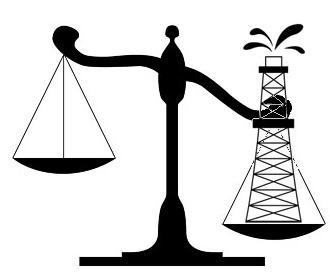Oil companies and shareholders most likely to benefit from lifting the ban on new offshore exploration and deepwater drilling not the “little guy”.
As I watch the news, I’m hearing both sides of debate regarding the deepwater, offshore drilling moratorium, which was sparked by the BP disaster in the Gulf of Mexico. The Obama Administration believes it is critical to “push the pause button” for six months until a full investigation is completed. The president wants to hear a national panel’s recommendations to improve worker safety and environmental protections on oil rigs before the he lifts the moratorium.
However, Federal District Court Judge Martin Feldman has lifted the temporary moratorium on new offshore exploration and deepwater drilling. The judge points out that some 150,000 jobs are directly related to offshore operations and is obviously concerned about the welfare of the laid-off oil rig workers. Riiight.
After reading the coverage surrounding the judge’s decision, I can’t help but wonder… “Who really benefits from lifting the ban on deepwater, offshore drilling?”
Judge Feldman and the companies who challenged the moratorium would like us to believe that the laid-off oil rig workers “would suffer irreparable harm under the moratorium”. In actuality, BP has agreed to contribute $100 million to a fund for rig workers, and President Obama has asked Congress for legislation for a program to provide unemployment assistance.
The oil companies should stop leveraging the dire economic situation of their workers to further their agendas. Sad, very sad.
What’s even more disturbing… according to Emma Ruby-Sachs, an attorney, Judge Feldman did not interpret the law accurately or fairly,
“There are a number of problems with his ruling. And, many sources indicate that the Judge has significant stock in oil and thus served to suffer significant personal loss if the moratorium was upheld. These allegations have not been confirmed, but if the intellectual missteps in Feldman’s decision are any indication of his bias, this adjudicator was seriously influenced by something other than the rule of law.”
Apparently, records show that the good judge had holdings of up to $15,000 in Transocean, the world’s largest offshore drilling company and the owner of the Deepwater Horizon rig. Plus, he has owned stock in offshore drilling or oilfield service providers Halliburton, Prospect Energy, Hercules Offshore, Parker Drilling Co., and ATP Oil & Gas.
How this judge was allowed to preside over the oil moratorium case is beyond me.
I believe the real reason for lifting the ban on deepwater, offshore drilling is eloquently stated by Gregory D.Lee,
“So long as Congress is hell-bent on further regulating the most regulated industry on the planet, oil companies will do what is right for their shareholders. They will pump oil in countries that actually want to harvest their own God-given natural resources, and sell them to countries like us that don’t.”
Six months isn’t a long time for corporations to wait for a full investigation. In fact, it’s sad to know that the lives of the eleven oil rig workers who were killed; the devastation caused to the environment; and the livelihoods of those in the Gulf aren’t worth a measly six months.
Bottom line….
Winners: oil company executives and oil company shareholders, which includes Judge Feldman
Losers: the planet, which means all of us
Follow Cindy Tickle on Twitter @ethicalbiz
Image Credit: Mike Licht, NotionsCapital.com via Flickr under a CC license







I am curious if Republicans in Congress would vote in favor of giving additional unemployment assistance to the laid-off oil rig workers…
Good question!
I am curious if Republicans in Congress would vote in favor of giving additional unemployment assistance to the laid-off oil rig workers…
Good question!